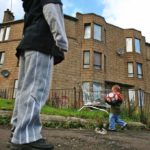 Poverty and inequality are some of the prevailing issues of our time, and new research from Harvard University highlights just how interlinked the two issues are. It shows that in areas of high income inequality, the poor are less likely to turn to their community for help for fear of shame or embarrassment.
Poverty and inequality are some of the prevailing issues of our time, and new research from Harvard University highlights just how interlinked the two issues are. It shows that in areas of high income inequality, the poor are less likely to turn to their community for help for fear of shame or embarrassment.
The authors believe their findings highlight why its vital for policymakers to look past a sole focus on helping low-income people and look instead at ways to make their communities stronger.
“If I’m poor, it exacerbates my need to rely on community, but what does it mean if I don’t trust my community? It means that there is no way for me to get what I need without putting myself in danger. This can have disastrous long-term effects among the poor,” the researchers say. “Our work shows that hardship increases for low-income individuals by reducing their ability to rely on their community as a buffer against financial and other related difficulties.”
Unequal poverty
The researchers conducted a number of studies involving over a million people from the United States, Australia and Uganda. Across each of them, the greater the economic inequality, the worse the poverty was for those with the lowest income.
They then discovered that a major reason for this was the feeling that people could not lean on their community for support when times were tough, and this left low-income people extremely isolated. This isolation was costing people around $6,587, which would make someone earning $36,587 in a town with high income inequality akin to one earning $30,000 in a more homogenous income area.
The researchers explain that there is a deep sense of self-awareness among low-income people, who care about how they’re perceived by others, which results in them not asking for help. This distrust was highest in communities with high inequality.
Cycle of poverty
Of course, this isn’t the only favor in perpetuating the cycle of poverty, with the researchers also identifying the need for people to show off their wealth via status symbols, which can place them even further into debt. Similarly, financial strife can encourage harmful behaviors, such as taking out payday loans, which can exacerbate the problem.
All of this places even greater importance on the role of local communities, with programs like the YMCA cited as especially valuable pillars of support. The researchers believe the infrastructure of a community is important to the strength of bonds created, with those that are walkable far closer than those where cars are the primary mode of transport.
“At a time when the coronavirus crisis puts a premium on cooperation and community support, our policymakers need to be aware of the social and economic conditions that eat away at such support, especially for the most vulnerable among us, the poor,” the researchers explain.